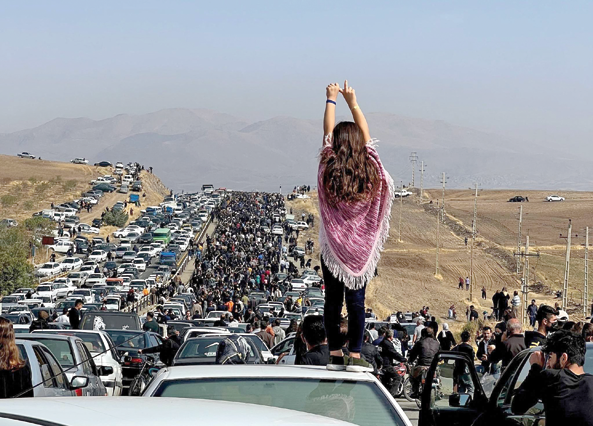You are here
Alarm grows over Iran protest crackdown in Kurdish city
By AFP - Oct 11,2022 - Last updated at Oct 11,2022

This grab taken from a UGC video made available on the ESN platform on Monday shows Iranian students chanting slogans as they protest at Tehran's Amirkabir University of Technology (AFP photo)
PARIS — Rights groups voiced alarm on Tuesday over the extent of an Iranian crackdown on a Kurdish-populated city that has become a hub for protests, as oil refinery workers took industrial action in a new tactic.
Iran's clerical authorities have been shaken by over three weeks of protests that erupted after the death of Mahsa Amini, a 22-year old Iranian of Kurdish origin, who had been arrested by the notorious morality police.
Despite the use of brutal force by the authorities that activists say has left dozens dead, and led to hundreds of arrests, there is so far no sign of the protest movement coming to an end.
Protests have been especially intense in the city of Sanandaj in the western province of Kurdistan, Amini's home region, where rights groups fear heavy casualties and accuse authorities of resorting to shelling of neighbourhoods.
The Norway-based Hengaw rights group said an Iranian warplane had arrived at the city's airport overnight and buses carrying special forces were on their way to the city from elsewhere in Iran.
It said residents were having problems sending video evidence of events due to internet restrictions but said a seven-year-old had been killed on Sunday night. AFP could not immediately verify the claims.
Hengaw said at least seven people had been confirmed killed by the security forces in Sanandaj and other Kurdish-populated cities since Saturday.
Amnesty International said it was "alarmed by the crackdown on protests in Sanandaj amid reports of security forces using firearms and firing teargas indiscriminately, including into people's homes".
On a visit to Sanandaj, Interior Minister Ahmad Vahidi reaffirmed Tehran's position — strongly contested by rights groups — that the unrest had been "supported, planned and carried out by separatist terrorist groups".
'All together!'
The New-York based Centre for Human Rights in Iran said there was a risk of a similar situation in Sistan-Baluchistan province in the southeast where activists say more than 90 people have been killed since September 30.
“The ruthless killings of civilians by security forces in Kurdistan province, on the heels of the massacre in Sistan-Baluchistan province, are likely preludes to severe state violence to come,” said its Director Hadi Ghaemi.
Analysts have said the protests are proving particularly challenging for the authorities under supreme leader Ayatollah Ali Khamenei, 83, due to their duration and multifaceted nature, ranging from street demonstrations to individual acts of defiance.
In a new development on Monday, protests spread to Iran’s oil refineries with videos showing striking workers burning tyres and blocking roads outside the Asalouyeh petrochemical plant in the southwest.
They could also be heard shouting slogans including “Death to the dictator” and “Don’t be scared, we are all together!”
Similar actions were in progress on Tuesday with Oslo-based group Iran Human Rights (IHR) saying strikes were in progress in Abadan in western Iran and Bushehr to the south.
State news agency IRNA denied there was any strike action in the area. The governor of Asalouyeh, Ali Hashemi, told the Fars news agency that “opportunists” who had caused fires in the area had been arrested.
University campuses and even school classrooms have also seen repeated protests, with students at the Amir Kabir University of Technology in Tehran on Monday shown chanting anti-regime slogans.
In a video shared by the 1500tasvir social media channel that monitors protests and police violations, students at the Tehran Art University were shown spelling out the Persian word for blood in a human chain.
‘Vain effort to silence’
The crackdown on the protests sparked by Amini’s death on September 16 has claimed at least 95 lives, according to IHR.
Activists say that among those who died in the protests are two teenage girls, Nika Shakarami and Sarina Esmailzadeh. Their families say they were killed by security forces after being detained. Authorities insist they died in falls.
UNICEF Executive Director Catherine Russel said: “We are extremely concerned by continuing reports of children and adolescents being killed, injured and detained.”
The crackdown has prompted international condemnation with US National Security Advisor Jake Sullivan telling Iran the “world is watching” and “will hold responsible those using violence in a vain effort to silence” protesters.
Britain said Monday it had imposed sanctions on Iran’s morality police, the unit which arrested Amini and enforces strict dress rules for women including the compulsory headscarf.
Iran said it has summoned the British ambassador to protest against the “baseless” sanctions.
French Foreign Minister Catherine Colonna said on Tuesday that five French citizens are currently being held in Iran. Paris had previously said four French were held. According to the Iranian intelligence ministry, at least one of nine foreigners Iran is holding over links to the protests is French.
Related Articles
PARIS, France — Iranian security forces have killed at least 448 people in a crackdown on protests that began in mid-September, over half in
PARIS — New protests erupted in Iran on Sunday at universities and in the largely Kurdish northwest, keeping a seven-week anti-regime moveme
PARIS — Iranian security forces Monday were using heavy weapons to suppress protests in Kurdish-populated regions in Iran's west, intensifyi













